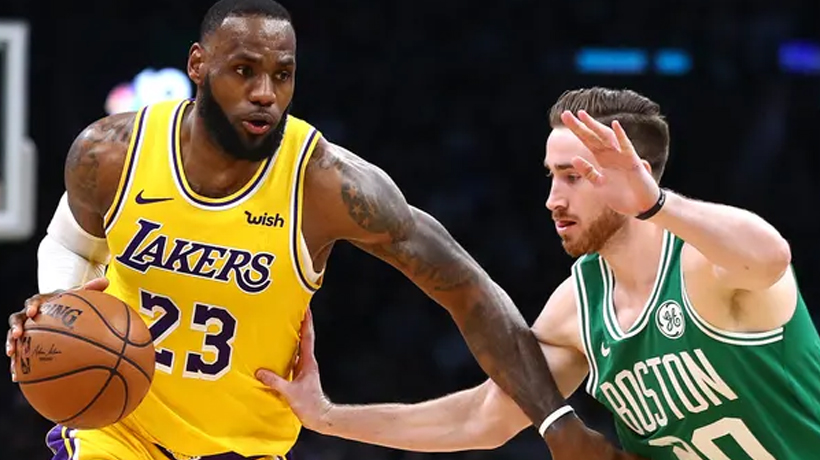Trending Now
- “I will soon make an announcement regarding a statewide tour across Tamil Nadu.” – O. Panneerselvam.
- Vatsala, Asia’s oldest elephant, has passed away at Panna Tiger Reserve; social activists mourn the death of this elephant, which lived for over 100 years.
- “The U.S. Govt earned ₹8 lakh crore this year through increased tariffs on foreign goods.” – U.S President Donald Trump.
- World No.1 Aryna Sabalenka has advanced to the semifinals in the Women’s Singles category at Wimbledon Tennis.
Sports
How do I feel seeing my NBA records get broken? Elated and inspired
![]() March 13, 2019
March 13, 2019
Every time I’m introduced in a public setting, my list of NBA records is announced. There aren’t as many now as there were when I retired, so at least my introduction takes less time. But whenever someone closes in on one of my remaining records, especially the Moby-Dick as the all-time leading scorer, I’m asked by dozens of media people whether I think they can do it and how I’ll feel if they do. It’s as if people think I’m sitting home watching the games chanting: Miss! Miss! Miss! Actually, when I see these talented veteran players’ remarkable athleticism while shooting, blocking and rebounding, I’m cheering them on with “Go, man, go!” which also is the title of a 1954 movie about the Harlem Globetrotters that first inspired my interest in basketball. I want them to break my records because doing so is one more benchmark of human progress.
Last week LeBron James passed Michael Jordan for fourth on the NBA’s all-time scoring list. That places him fourth – right behind Kobe Bryant, Karl Malone and me. Of course, I was bombarded with requests for my reaction, which I expressed in my Instagram message to LeBron: “Hey LeBron, I just wanted to congratulate you on your most recent accomplishment, passing Michael Jordan. I know he was your hero, and how much it means to you to pass someone that you admired your whole life. The same thing happened to me, back in 1984, when I was able to pass Wilt [Chamberlain]’s record, someone that I had admired when I was a kid. So I know what that means to you, and it’s a very special day, so congratulations for that. Everybody’s asking me how I’m going to react if you pass my record. Only thing I have to say is, if and when that happens, I’ll be glad that it’s somebody that has shown as much class and caring as you have. All the best and enjoy.”
These vigorous arguments and speculations about sports records aren’t just about statistics for fans in sports bars to chatter about over beer and pizza. Breaking athletic records is important to a society because every time we extend a jump by half an inch or shave a race by a tenth of a second, we’re pushing the boundaries of what we think the human body is capable of. Each time an athlete demonstrates that a person is capable of more than we thought, they have inspired all of humanity to realize that they are capable of reaching further than they thought possible. Nowhere is that sentiment better expressed than in another of my favorite sports movies, Vision Quest, in which a high school wrestler, Louden, tells his co-worker, Elmo, a middle-aged fry cook who lives in a crappy apartment, that he’s considering not showing up for his wrestling match against the undefeated state champion because his girlfriend just dumped him. Louden is surprised to see Elmo has dressed up in a suit and is taking time off work to come to the match. Louden tries to downplay the match, saying it’s no big deal. To which Elmo responds by telling him about the first time he saw Pelé play soccer: “I was in the room here one day … watchin’ the Mexican channel on TV. I don’t know nothin’ about Pelé. I’m watchin’ what this guy can do with a ball and his feet. Next thing I know, he jumps in the air and flips into a somersault and kicks the ball in – upside down and backwards … the goddamn goalie never knew what the fuck hit him. Pelé gets excited and he rips off his jersey and starts running around the stadium waving it around his head. Everybody’s screaming in Spanish. I’m here, sitting alone in my room, and I start crying. That’s right, I start crying. Because another human being, a species that I happen to belong to, could kick a ball, and lift himself, and the rest of us sad-assed human beings, up to a better place to be, if only for a minute … let me tell ya, kid – it was pretty goddamned glorious.” Everyone who’s ever watched as an Olympic gymnast somersaults impossibly high with unimaginable speed and unprecedented control, shares that tingle of stunned elation and burst of pride that a human being can do that. Followed by the realization: maybe there’s more that I can do, too.
A historic aspect of record breaking that can’t be ignored is that people of color have motivated themselves to break records as a way of proving themselves to a predominantly white society. In some sports, it has only been decades since we have been allowed to compete alongside white players: 1950 for the NBA, 1947 for the MLB, 1946 for the NFL. The fame, the money, and the adulation that players of color earn when breaking records adds status to their entire community.
Sometimes I think people overlook equally important statistics. My basketball hero, Wilt Chamberlain, who retired 56 years ago, still holds 72 NBA records, several of which are considered unbreakable, including scoring 100 points in a single game. In the 1961-62 season, Wilt set the NBA record of most field goals made (1,597). However, in that same season, he also holds the record for the most field goals missed (1,562). At the same time we celebrate record achievements, we need to acknowledge epic failures that make those achievements possible. Our successes make us happy, but our failures make us stronger. Michael Jordan expressed that awareness best: “I’ve missed more than 9,000 shots in my career. I’ve lost almost 300 games. Twenty-six times I’ve been trusted to take the game winning shot and missed. I’ve failed over and over and over again in my life. And that is why I succeed.”
What will I be doing the day LeBron – or some little kid on a playground right now chucking up free throws – breaks my record? I’ll be cheering from the stands, “Go, man, go!”
























